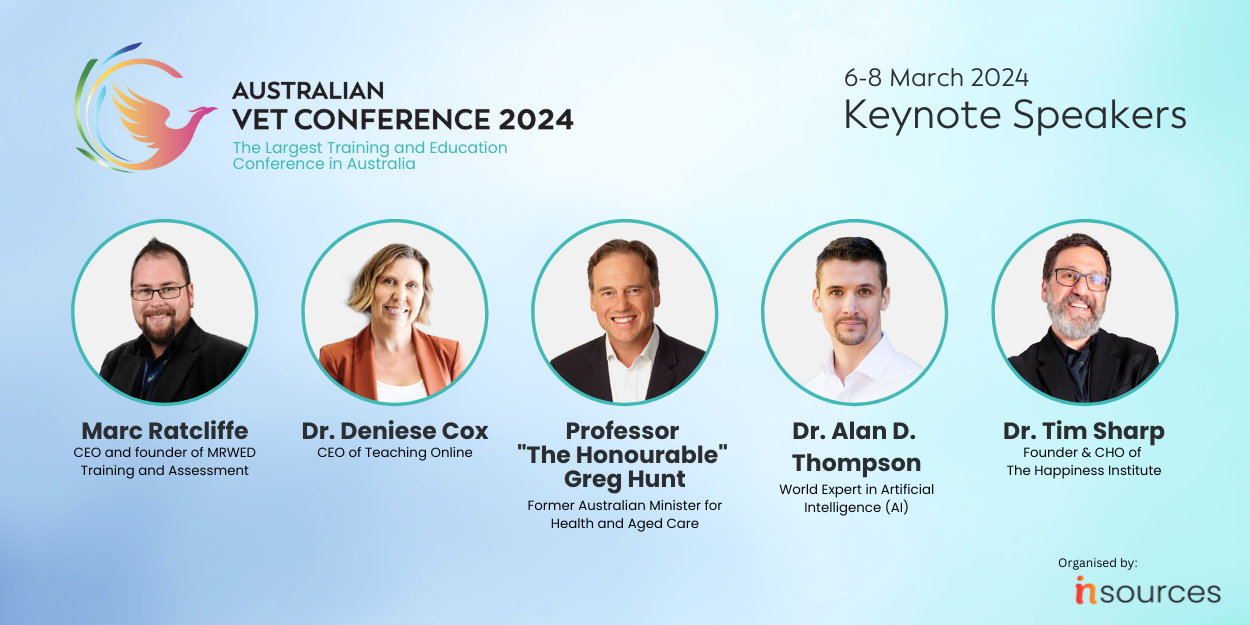The impact of the Vocational Education and Training (VET) sector in the Australian workforce cannot be denied. With nearly 500 Registered Training Organisations (RTO), it has persistently provided economic growth by mobilising human capital to different industries. And as it continues to be a growing sector, the Australian VET Conference this coming March 2024 is here to show that we will Rise Beyond Adversity.
Over 35 speakers who are experts across all fields related to VET will give talks about learner involvement and experience, engagement success, adult education, online strategies and many more you are guaranteed to acquire new skills, expand your network, keep up-to-date with latest VET trends and developments, and gain insights especially from the following keynote speakers:
- Former cabinet minister Professor The Honourable Greg Hunt will advise on businesses in the areas of innovation, leadership, strategic planning, health and environment.
- Dr Tim Sharp aka Dr Happy will share his expertise in positive psychology and teach how to enhance happiness in individuals and organisations.
- Dr Alan D. Thompson will provide artificial intelligence (AI) advisory to conference participants and introduce the evolution of ‘integrated AI.’
- CEO and founder of MRWED Training and Assessment, Marc Ratcliffe will share his 25-year experience in the VET sector and his advocacy on ‘edu-tainment.’
- Founder of Teachingonline.com.au, Dr Deniese Cox will talk about effective online strategies perfect for VET educators and practitioners.
This conference will present the challenges and adversities the different industries, RTOs, regulators and learners are facing; the solutions to these challenges; feats and achievement; and the vision for the VET sector in Australia. In pursuit of this, the conference will focus on:
- Making VET programs responsive to industry needs,
- Ensuring VET is accessible to all Australians,
- Using technology to improve education outcomes,
- Developing a culture of quality and self-assurance, and
- Delivering a workforce that works better.
The VET sector’s continued success lies in industry engagement. Not only is it an ASQA standard (Clauses 1.5 and 1.6), engaging with industries has a profound impact on the VET system and RTOs. Here are key reasons why industry engagement is crucial to VET programs:
- Industry expectations – Industries have expectations that learners will have particular knowledge and skill set after acquiring certifications or qualifications that fit their employment. It is therefore important for organisations to know expectations and develop training well-suited for each industry. This will make learners adequately equipped with the right skills and knowledge in their workplace.
- Evolution of industries – If the training packages delivered to learners are not up-to-date with current methods, technology and products, the curriculum along with the learners would not meet the industry standards. So keeping up with the evolution of industries is a must and this means aligning the training and assessments to the current industry standards.
- Contribution to society – Our role is important in reaching economic prosperity, keeping the quality of adult education, and giving individuals a chance to lead meaningful jobs. It is then our responsibility to always strive for improvement for the betterment of society.

How can this be done? We can make VET responsive to industry needs by keeping these things in mind:
- Build and cultivate relationship with industries – One way of being in the loop with an industry is to connect with people. Not only does this widen your network, it also allows you an access to knowing more about your industry partner including updates on the newest technologies and innovations and insights on plans and future ventures.
- Align training and assessment – Being responsive to industry needs requires listening to the needs, updates and changes in the industry and applying the necessary strategies, practices and resources in the programs and in developing the industry skills of trainers and assessors as well.
- Involve relevant entities in instructional design – Creating instructional materials is a meticulous and rigorous process. It involves using the correct tools and strategies, and ensuring that information is factual. Consulting industry and subject matter experts may give benefit in developing learning strategies as well as guarantee the quality of learning materials.
Get a better understanding of this topic by joining us next year at the 2024 Australian VET Conference!
Attending the conference will not only give personal and professional development, it will also be a form of industry engagement crucial to the cultivation of the VET sector. So register with your team today to take advantage of our early bird discount! Get your tickets here.





